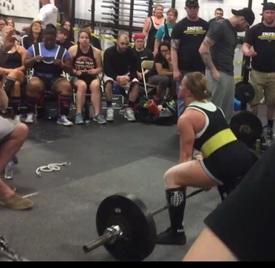Reducing BF% - to eat at a deficit or not?

LaurenAOK
Posts: 2,475 Member
Hi MFPers! I saw a topic kind of like this posted recently but it never really got a conclusive response. I am going to explain my personal situation and see what people suggest because I'm kind of at a loss right now.
I have reached my goal weight (I know my ticker says I have 5 pounds to go, but I'm actually at my original goal weight of 130 right now. 125 would be cool but I don't have my heart set on it). I feel pretty happy with myself, but my goal now is to be fit rather than just "thin." Basically, I want what everyone wants: to reduce fat and replace it with muscle. At this point I want to focus on my BF% more than the scale.
As of the past few weeks I have been a clean eater. I've come to love it and plan to stick to that lifestyle. I do cardio (running) every other day, and weightlifting on the days in between (NROLFW). But the layer of fat on my stomach just doesn't want to go away. I can feel myself getting a lot stronger, but no visible abs yet. My current BF% is around 23%. I'd like to get below 20%.
So here's the question: do I eat at a deficit, or not? I've been eating at maintenance since I reached my goal weight, but I've had someone tell me I need to go back to eating at a deficit to get rid of that fat. However, I've seen other people say you can't build muscle while on a deficit, and building muscle is kind of what I'm trying to do, right? I'm just really confused. Any insight would be appreciated.
PS If you look at my diary you'll see I haven't really logged in forever. That's because once I hit my goal weight I started eating at maintenance and I logged everything at first; then once I got the hang of how much to eat each day I stopped logging. If I decide to go back to a deficit I will start logging again.
Stats:
5'4"
21 years old
130 lbs
23% BF
I usually burn around 300 calories a day exercising, which I drink back in a double-scoop protein shake
I have reached my goal weight (I know my ticker says I have 5 pounds to go, but I'm actually at my original goal weight of 130 right now. 125 would be cool but I don't have my heart set on it). I feel pretty happy with myself, but my goal now is to be fit rather than just "thin." Basically, I want what everyone wants: to reduce fat and replace it with muscle. At this point I want to focus on my BF% more than the scale.
As of the past few weeks I have been a clean eater. I've come to love it and plan to stick to that lifestyle. I do cardio (running) every other day, and weightlifting on the days in between (NROLFW). But the layer of fat on my stomach just doesn't want to go away. I can feel myself getting a lot stronger, but no visible abs yet. My current BF% is around 23%. I'd like to get below 20%.
So here's the question: do I eat at a deficit, or not? I've been eating at maintenance since I reached my goal weight, but I've had someone tell me I need to go back to eating at a deficit to get rid of that fat. However, I've seen other people say you can't build muscle while on a deficit, and building muscle is kind of what I'm trying to do, right? I'm just really confused. Any insight would be appreciated.
PS If you look at my diary you'll see I haven't really logged in forever. That's because once I hit my goal weight I started eating at maintenance and I logged everything at first; then once I got the hang of how much to eat each day I stopped logging. If I decide to go back to a deficit I will start logging again.
Stats:
5'4"
21 years old
130 lbs
23% BF
I usually burn around 300 calories a day exercising, which I drink back in a double-scoop protein shake
0
Replies
-
Dang this forum moves fast, I was already on the next page. Shameless self-bump!0
-
No one? A'ight, dat's cool.0
-
Since eating at maintenance, what has your body composition done? How long have you been eating at maintenance for?
How many grams of protein do you average per day?0 -
Good evening!
I have the same issue, I believe...my body is toning up nicely, I am eating much healthier than I ever have, and I am much more healthy. However, I'm seeing no results in my abdominal area! I have a beer belly that I want to see disappear. See?
I have been told to eat at a slight deficit and do some weight lifting. I have also had Jillian Michaels' 30 Day Shred suggested to me. Furthermore, I have been told that I need to eat more protein. I am taking all of the advice I have been given. Why not give it a shot, y'know? Same goes for you.
Try more protein, weight lifting, and core workouts. I'd try Jillan's 30DS, too. Why not?
Best of luck!0 -
I didn't really see a change in body fat until I started taking the advice of a trainer and really ramped up my exercise effort. Are you doing sprint intervals?...are you weight lifting to sweating?....are you doing come cardio bursts inbetween the weight sets...?
These are the kinds of things my trainer got me doing and I dropped 3 % body fat each month for about 4 months...
Great results.0 -
Interested in the responses. I feel like my body isn't changing anymore.0
-
Your questions were already answered in this thread.
http://www.myfitnesspal.com/topics/show/600953-are-good-fats-good-for-losing-fat0 -
Well I was eating at a deficit and doing HIIT when I went from 22% to 19% in 4 weeks. I've since upped to my TDEE and now at a maintence but lifting alot heavier and more. Still doing HIIT and running though. I've dropped weight even with my increase. I'll know first week of June if I've dropped anymore BF%.0
-
Interested in the responses. I feel like my body isn't changing anymore.
I'm going to take an educated guess that your circumstance will be different than the above posters as you are already quite lean.0 -
Bump.0
-
Since eating at maintenance, what has your body composition done? How long have you been eating at maintenance for?
How many grams of protein do you average per day?
I've been eating at maintenance for about two months, I believe. My body composition basically hasn't changed. Well, scratch that - I have become visibly stronger, especially in my arms. I can see a *little* more definition in my abs than I could before, but I can feel a layer of fat on top of them.
I aim for 100g of protein per day - thats 1g per lb of lean body mass. I fall a little short some days. I'd say I get no less than 80g and no more than 110g per day.0 -
You can not build muscle while eating a deficit, it is not possible.0
-
Since eating at maintenance, what has your body composition done? How long have you been eating at maintenance for?
How many grams of protein do you average per day?
I've been eating at maintenance for about two months, I believe. My body composition basically hasn't changed. Well, scratch that - I have become visibly stronger, especially in my arms. I can see a *little* more definition in my abs than I could before, but I can feel a layer of fat on top of them.
I aim for 100g of protein per day - thats 1g per lb of lean body mass. I fall a little short some days. I'd say I get no less than 80g and no more than 110g per day.
If I were you, I would take a good hard look in the mirror AND at photos and I would decide whether or not you would rather:
1) Lose more fat at the expense of delaying your lean muscle gains. You will probably lose a bit more weight and it will get difficult as you get leaner.
2) Gain some muscle with the realization that you will gain some weight and you will gain some fat.
I would decide on one or the other and I would base your diet off of that decision.0 -
You can not build muscle while eating a deficit, it is not possible.
Yes, I understand that. That wasn't really my question. What I'm asking is, if I'm trying to "tone up" - get rid of the excess fat, and have visible muscle - should I be eating at a deficit or not? Basically, should I be focusing more on getting rid of fat, or building muscle? Obviously my goal is to do both but I can't do them at the same time.0 -
I can only say what I'm doing. Based on my measurements, I've put on 1 lb of muscle in like 6 months, while losing like 5 pounds of fat. I eat in a deficit most days, but when I'm hungry on a workout day, I eat more, sometimes maintenance, sometimes more, sometimes less. I like this because it's basically just eating when I'm hungry and not when I'm not. On the other hand, it is really slow moving. Then again, I guess that recomp isn't supposed to be quick and easy.
ETA: People say you can't do both, and I agree to an extent. I probably had some combination of periodic calorie surplus and newbie gains since I had taken a couple months off.0 -
You can not build muscle while eating a deficit, it is not possible.
Yes, I understand that. That wasn't really my question. What I'm asking is, if I'm trying to "tone up" - get rid of the excess fat, and have visible muscle - should I be eating at a deficit or not? Basically, should I be focusing more on getting rid of fat, or building muscle? Obviously my goal is to do both but I can't do them at the same time.
Getting rid of fat will require a calorie deficit.0 -
Since eating at maintenance, what has your body composition done? How long have you been eating at maintenance for?
How many grams of protein do you average per day?
I've been eating at maintenance for about two months, I believe. My body composition basically hasn't changed. Well, scratch that - I have become visibly stronger, especially in my arms. I can see a *little* more definition in my abs than I could before, but I can feel a layer of fat on top of them.
I aim for 100g of protein per day - thats 1g per lb of lean body mass. I fall a little short some days. I'd say I get no less than 80g and no more than 110g per day.
If I were you, I would take a good hard look in the mirror AND at photos and I would decide whether or not you would rather:
1) Lose more fat at the expense of delaying your lean muscle gains. You will probably lose a bit more weight and it will get difficult as you get leaner.
2) Gain some muscle with the realization that you will gain some weight and you will gain some fat.
I would decide on one or the other and I would base your diet off of that decision.
This is good advice, thank you. I guess in the end it's kind of up to me :P
I think I would like to go with option 1 first. Try to get rid of some excess fat, THEN work on building muscle. Does that sound reasonable, or is it better to do it the other way around? I guess what I'm afraid of with that option is that I'll lose the fat, then eat at maintenance or even a slight surplus to gain muscle, but end up just gaining fat again.0 -
I can only say what I'm doing. Based on my measurements, I've put on 1 lb of muscle in like 6 months, while losing like 5 pounds of fat. I eat in a deficit most days, but when I'm hungry on a workout day, I eat more, sometimes maintenance, sometimes more, sometimes less. I like this because it's basically just eating when I'm hungry and not when I'm not. On the other hand, it is really slow moving. Then again, I guess that recomp isn't supposed to be quick and easy.
This is also good advice. Thanks! Eating when I'm hungry is basically what I've been doing, and maybe I'm just not seeing results yet because it's so slow-moving. I'll keep this in mind.0 -
I think I would like to go with option 1 first. Try to get rid of some excess fat, THEN work on building muscle. Does that sound reasonable, or is it better to do it the other way around? I guess what I'm afraid of with that option is that I'll lose the fat, then eat at maintenance or even a slight surplus to gain muscle, but end up just gaining fat again.
When you go into surplus eating you will gain fat along with the muscle. You will then go into another cutting phase later on to remove as much of the fat as possible. It's a constant battle where you gain fat and muscle, and you lose fat and muscle. Your goal is to minimize the fat gains during a bulk and minimize the lean losses during a cut. (EDIT: I'm generalizing a bit here, that previous sentence isn't universally true but I'm trying to make a point).
If you do it correctly (no extreme surplusses or deficits, adequate macro intake, sufficient training stimulus) then you'll come out well ahead when you look at multiple cycles of bulking and cutting.
It's not a one time thing, you will likely have to do a few cycles in order to achieve the image that you probably have in your head of your goal physique.
EDIT: Lastly, your decision to cut a bit further seems reasonable to me. Keep the calorie deficit small and re-evaluate in 4 weeks or so, in my opinion.0 -
thanks for restating this Q!! i was initially wondering about articles and claims that "good" fats can help you burn fat easier... but after the responses i got.. i too, am pondering this!
from what i gathered:
to drop body fat% you must lose fat (and ultimately weight) by eating at a deficit and once you reach goal BF% you begin to eat a surplus to gain more muscle but you will also be putting fat back on...
hmph... probably not what we wanted to hear. in a perfect world we could lose BF and gain muscle pound for pound,..
poppycock!0 -
If you want practical recommendations on whether you should bulk or cut, read this:
http://www.bodyrecomposition.com/muscle-gain/initial-body-fat-and-body-composition-changes.html
Also, note that simply being in a deficit is not all that is required in order to lose fat while preserving muscle mass (in most cases).0 -
I think I would like to go with option 1 first. Try to get rid of some excess fat, THEN work on building muscle. Does that sound reasonable, or is it better to do it the other way around? I guess what I'm afraid of with that option is that I'll lose the fat, then eat at maintenance or even a slight surplus to gain muscle, but end up just gaining fat again.
When you go into surplus eating you will gain fat along with the muscle. You will then go into another cutting phase later on to remove as much of the fat as possible. It's a constant battle where you gain fat and muscle, and you lose fat and muscle. Your goal is to minimize the fat gains during a bulk and minimize the lean losses during a cut. (EDIT: I'm generalizing a bit here, that previous sentence isn't universally true but I'm trying to make a point).
If you do it correctly (no extreme surplusses or deficits, adequate macro intake, sufficient training stimulus) then you'll come out well ahead when you look at multiple cycles of bulking and cutting.
It's not a one time thing, you will likely have to do a few cycles in order to achieve the image that you probably have in your head of your goal physique.
EDIT: Lastly, your decision to cut a bit further seems reasonable to me. Keep the calorie deficit small and re-evaluate in 4 weeks or so, in my opinion.
Very good info, thank you so much. This is serious business, haha! I once dated a bodybuilder-type and he was always doing the cutting and bulking thing. I didn't think much of it then but now I wish I'd asked him to teach me about it!
It sounds like it's going to take a lot of patience to get to where I want to be, and I'm typically an impatient person, but I'm going to have to just tough it out. MFP is very helpful!0 -
Also, note that simply being in a deficit is not all that is required in order to lose fat while preserving muscle mass (in most cases).
^ Absolutely agree with this.0 -
If you want practical recommendations on whether you should bulk or cut, read this:
http://www.bodyrecomposition.com/muscle-gain/initial-body-fat-and-body-composition-changes.html
Also, note that simply being in a deficit is not all that is required in order to lose fat while preserving muscle mass (in most cases).
Bookmarking the page! Thank you!0 -
Oh dear god... this is pointless.thanks for restating this Q!! i was initially wondering about articles and claims that "good" fats can help you burn fat easier... but after the responses i got.. i too, am pondering this!
from what i gathered:
to drop body fat% you must lose fat (and ultimately weight) by eating at a deficit and once you reach goal BF% you begin to eat a surplus to gain more muscle but you will also be putting fat back on...
hmph... probably not what we wanted to hear. in a perfect world we could lose BF and gain muscle pound for pound,..
poppycock!0 -
You can not build muscle while eating a deficit, it is not possible.
Yes, I understand that. That wasn't really my question. What I'm asking is, if I'm trying to "tone up" - get rid of the excess fat, and have visible muscle - should I be eating at a deficit or not? Basically, should I be focusing more on getting rid of fat, or building muscle? Obviously my goal is to do both but I can't do them at the same time.
Eat at a deficit and start hitting the weights. But like you said you have to pick one. I would personally start putting some muscle on and then you may gain a few pounds but it will be lean muscle. I dont know how you would feel about gaining some weight considering you were just trying to lose it. But then do another cut and you will have a good muscle base underneath.0 -
Have you visited leangains.com? Ab fat is really stubborn and I know a lot of people on that site have had success with IF. Good luck!0
-
Would it work well if you ate at maintenance and created your deficit through exercise? Or do you have to eat at a deficit too?0
-
1) Lose more fat at the expense of delaying your lean muscle gains. You will probably lose a bit more weight and it will get difficult as you get leaner.
2) Gain some muscle with the realization that you will gain some weight and you will gain some fat.
kenny-- is this pointless too?0 -
Generally speaking, it won't matter how the deficit is created (although it's not actually this clear-cut).Would it work well if you ate at maintenance and created your deficit through exercise? Or do you have to eat at a deficit too?
But in most cases you should just create the deficit through your diet. Relatively speaking, exercise generally has a small effect on the rate of weight loss. Unless you're capable of literally hours upon hours of daily exercise, the "burn" you create will generally be small compared to the deficit you create through your diet. Because ultimately, in terms of weight loss, the deficit is what matters, not how many calories you burn (you can burn 1000 calories and then eat all of it back plus some more, and therefore be in a surplus).
Which is not to say that exercise does not have benefits in a deficit (i.e. calorie partitioning, adherence to the diet, etc etc.).0
This discussion has been closed.
Categories
- All Categories
- 1.4M Health, Wellness and Goals
- 398.2K Introduce Yourself
- 44.7K Getting Started
- 261K Health and Weight Loss
- 176.4K Food and Nutrition
- 47.7K Recipes
- 233K Fitness and Exercise
- 462 Sleep, Mindfulness and Overall Wellness
- 6.5K Goal: Maintaining Weight
- 8.7K Goal: Gaining Weight and Body Building
- 153.5K Motivation and Support
- 8.4K Challenges
- 1.4K Debate Club
- 96.5K Chit-Chat
- 2.6K Fun and Games
- 4.8K MyFitnessPal Information
- 12 News and Announcements
- 21 MyFitnessPal Academy
- 1.6K Feature Suggestions and Ideas
- 3.2K MyFitnessPal Tech Support Questions










